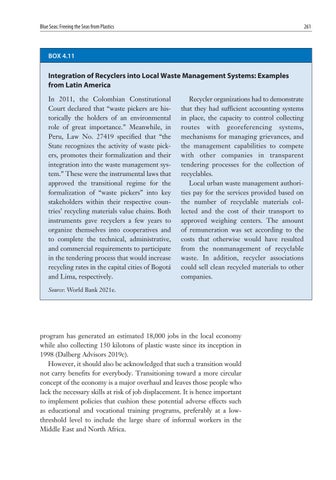Blue Seas: Freeing the Seas from Plastics
261
BOX 4.11
Integration of Recyclers into Local Waste Management Systems: Examples from Latin America In 2011, the Colombian Constitutional Court declared that “waste pickers are historically the holders of an environmental role of great importance.” Meanwhile, in Peru, Law No. 27419 specified that “the State recognizes the activity of waste pickers, promotes their formalization and their integration into the waste management system.” These were the instrumental laws that approved the transitional regime for the formalization of “waste pickers” into key stakeholders within their respective countries’ recycling materials value chains. Both instruments gave recyclers a few years to organize themselves into cooperatives and to complete the technical, administrative, and commercial requirements to participate in the tendering process that would increase recycling rates in the capital cities of Bogotá and Lima, respectively.
Recycler organizations had to demonstrate that they had sufficient accounting systems in place, the capacity to control collecting routes with georeferencing systems, mechanisms for managing grievances, and the management capabilities to compete with other companies in transparent tendering processes for the collection of recyclables. Local urban waste management authorities pay for the services provided based on the number of recyclable materials collected and the cost of their transport to approved weighing centers. The amount of remuneration was set according to the costs that otherwise would have resulted from the nonmanagement of recyclable waste. In addition, recycler associations could sell clean recycled materials to other companies.
Source: World Bank 2021e.
program has generated an estimated 18,000 jobs in the local economy while also collecting 150 kilotons of plastic waste since its inception in 1998 (Dalberg Advisors 2019c). However, it should also be acknowledged that such a transition would not carry benefits for everybody. Transitioning toward a more circular concept of the economy is a major overhaul and leaves those people who lack the necessary skills at risk of job displacement. It is hence important to implement policies that cushion these potential adverse effects such as educational and vocational training programs, preferably at a lowthreshold level to include the large share of informal workers in the Middle East and North Africa.






